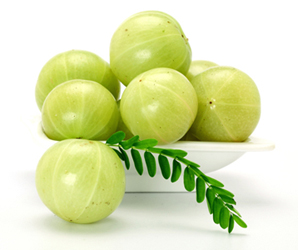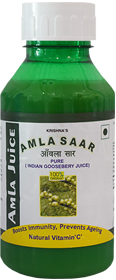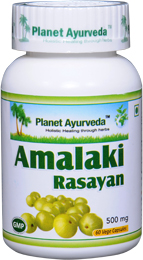Planet Ayurveda is known for Quality natural Supplements made from Amla fruit which is the richest source of natural vitamin. Ayurveda has recommended Amla as best rasayana herb i.e. best anti-ageing supplement which can be consumed by people from all age groups, diseased or healthy individual, children, pregnant women or to supplement diet. To honor this nature’s gift, We have developed a range of Amla products which are giving extraordinary benefits to all the users even they are sick or healthy.
Benefits of Amla and Natural Vitamin C

Charak Smahita is an ancient ayurvedic medicine text -500 BC and Amla is perhaps the most often mentioned herb in that book. It can be used in almost every other health concern. Now a days it has rather wider spectrum of uses as there are more and more chemicals, pollutants, stress we are exposed to everyday.
Amla grows in nature in Indian subcontinent and our amla fruits are all organic growing in our Amla fruit farms located away from city pollution. All the herbal supplements made from amla are giving excellent results because we do not procure amla fruits from the market but prefer fresh amla fruits directly from the trees !
The fruit is has the highest content of vitamin C of any natural occurring substances in nature. Amla is most useful treatment of ulcers and hyperacidity.
- Amla is a strong natural anti-oxidant
- Amla is best natural anti-ageing substance
- Amla is richest source of natural vitamin C on earth
- Amla is useful in stomach ulcers and acidity
- Amla counteracts damage done by drugs, pollution and stress
- Amla improves overall well being
- It aids in food asorption and digestion
- It prevents premature ageing, premature graying of hair, hair fall
- It strengthens the immune system of the body naturally
- Amla acts as a coolant
- It neutralizes the free radicals / chemicals and acids produced in the body due to drugs, anxiety, stress, pollution
- Amla is useful in bleeding piles and bleeding from anywhere in the body
- Amla is useful in scurvy and vitamin C deficieny
- Amla is excellent for treating skin disorders as it has detoxifying properties.
- Amla is also useful in eye weakness and general weakness
- Amla builds up immune system to fight against all kind of viruses like those of hepatitis, AIDS, Influenze and many others as Amla is rich in natural Vitamin C
- Amla juice reduces unwanted fat and it also significantly reduce levels of free fatty acids. In addition, Amla, in a pure form i.e. Amla juice reduces cholesterol and cholesterol induced atherosclerosis (Obstruction of the arteries), making it a useful natural product to fight obesity
Chemical Composition of Amla Fruit
The fruit pulp, which constitutes 90.97 per cent of the whole fruit, contains 70.5 per cent moisture. The total soluble solids constitute 23.8 per cent of the juice. The acidity of Amla is 3.28 per cent on pulp basis. The pulp contains 5.09 percent total sugars and 5.08 per cent reducing sugars. The ascorbic acid content is 1,094.53 mg per 100 ml of juice. The tannins and pectin content of the pulp is 2.73 per cent and 0.59 per cent respectively.
The fruit pulp contains 0.75 per cent protein. The mineral content of the edible portion, as represented by its ash, is 2.922 per cent. The percentage content of the mineral elements, viz. phosphorus, potassium, calcium, magnesium, and iron is 0.027, 0.368, 0.059, 0.248 and 0.004 respectively.
About Amla Supplements
1. Amla Saar
Amla supplements are in growing demand now a days. The reason the search for perfect source of natural vitamin C leads to this wonderful nature’s gift. This fresh juice of Amla fruits can yield upto 800 to 1500 mg of natural vitamin C per 100 grams.
The laboratory analysis of our Amla juice confirms the natural vitamin C content of between 625 to 930 mg per 100 ml. That means 10 ml of Amla juice provides 62.5 mg to 93 mg. 2 tablespoonfuls are sufficient enough for people to maintain healthy life style and 10-20 ml is recommended twice daily for patients suffering from debilitating run down health conditions like cancers, diabetes, blood pressure, chemotherapy, stress, anxiety and depression.
Government recommended daily intakes of Vitamin C or Daily requirement of Vitamin C
Recommendations for Vitamin C intake have been set by Various National Agencies:
- 75 milligrams per day: the United Kingdom’s & Food Standards Agency
- 45 milligrams per day: the World Health Organization
- 90 mg/day (males) and 75 mg/day (females): Health Canada 2007
- 60-95 milligrams per day: United States’ National Academy of Sciences.
The United States defined Tolerable Upper Intake Level for a 25-year-old male is 2,000 milligrams per day.
Vitamin C Megadoses – For Optimum health, many reasearchers believe that the Recommended dosage of Vitamin C by various government organizations is not suitable. They say this can be the dosage for prevention of mere scurvy or other disease but for optimum health the requirement of the body is much higher.
Researchers Stone and Pauling believed that the optimum daily requirement of vitamin C is around 2,300 milligrams for a human requiring 2,500 kcal a day. Pauling criticized the established RDA as sufficient to prevent scurvy, but not necessarily the dosage for optimal health.[110]
Vitamin C is a water soluble vitamin and it is not stored in the body. It is important to consume it on everyday basis in diet.
The Vitamin C content of Amla Saar is between 625 mg-930 mg per 100 grams ! Amla juice has 20-25 times more vitamin C than orange juice. Wow ! Isn’t it amazing ?
Comparison of Amla Saar with other Sources of Vitamin C:
Daily Requirement of Vitamin C 90-150 mg per DA
| 1. | Amla Saar | 625-930mg |
| 2. | Kaju (Cashew Nuts-kernels) | 200 mg |
| 3. | Amrood (Guava) | 160 mg |
| 4. | Dhania Leaves (Green Coriander) | 135 mg |
| 5. | Chukandar (Beetroot) | 88 mg |
| 6. | Cabbage | 85 mg |
| 7. | Papaya | 57 mg |
| 8. | Cauliflower | 56 mg |
| 9. | Pineapple | 39 mg |
| 10. | Orange | 30 mg |
| 11. | Lemon | 26 mg |
Amla Juice is richest source of natural vitamin C and we provide the best Amla Juice also known as Indian Gooseberry Juice.
Our Amla Juice does not contain any flavoring agents, concenterates, water or coloring agents. It is a pure Amla juice made directly from Amla berries known as Indian gooseberries.
Amla juice reduces unwanted fat because it increases total protein levels; this is due to its ability to create a positive nitrogen balance and it also significantly reduces the levels of free fatty acids. In addition, Amla, in a raw or natural form, reduces cholesterol and cholesterol induced atherosclerosis (Obstruction of the arteries), making it a useful natural product to fight obesity. One study shows that it prevented atheroma (degeneration of the artery walls due to fat and scar tissue). Furthermore, Amla juice has exhibited considerable effect in inhibiting the HIV virus which ultimately results in the disease AIDS.
Medicinal Properties of Amla Juice
The medicinal properties of Emblica officinalis have been mentioned by many authors.
- Journal of Ethnopharmacol 1996 Feb;50(2):61-8 Hypolipidaemic effect of fruit juice of Emblica officinalis in cholesterol-fed rabbits. By Mathur R, Sharma A, Dixit VP, Varma M. Department of Home Science (Food and Nutrition), University of Rajasthan, Jaipur, India. The lipid lowering and antiatherosclerotic effects of Emblica officinalis (Amla) fresh juice were evaluated in cholesterol-fed rabbits (rendered hyperlipidaemic by atherogenic diet and cholesterol feeding). E. officinalis fresh juice was administered at a dose of 5 ml/kg body weight per rabbit per day for 60 days. Serum cholesterol, TG, phospholipid and LDL levels were lowered by 82%, 66%, 77% and 90%, respectively. Similarly, the tissue lipid levels showed a significant reduction following E. officinalis juice administration. Aortic plaques were regressed. E. officinalis juice treated rabbits excreted more cholesterol and phospholipids, suggesting that the mode of absorption was affected. E. officinalis juice is an effective hypolipidaemic agent and can be used as a pharmaceutical tool in hyperlipidaemic subjects.
- Amla Saar is used in treatment of Acne and other skin problems.
- Amla Saar is very effective in treatment of Acidity and Peptic ulcers.
- Amla Saar is rich in Vitamin C, Calcium, Iron, essential amino acids and many other vitamins and minerals and anti-oxidants.
- Regular Use of Amla Saar improves immunity, fights cancers, rejuvenates the body.
- It fights chronic diseases like hypertension, high Cholesterol, Diabetes, AIDS, influenza, Chronic cough and cold, Chronic infections, Chronic fatigue and Chronic inflammatory conditions.
- Ayurveda describes it as one of the best herbs for Diabetes, bleeding disorders, strength and stamina promoter.
Dosage of Amla Juice
3 teaspoonful twice daily, Morning and Evening with equal water.
2. Amla Capsules
- Natural Vitamin C is nature’s best Anti-ageing substance on earth ! !
- Natural Vitamin C is nature’s best anti-oxidant
- Best Natural Vitamin C Supplements are all made from Amla fruit
Supplement Facts:
- Serving size: 1 Vegi cap
- Servings per container: 60
- Each 250 mg capsule contains: Amla fruit extract (Emblica officinalis)
Dosage: 1-2 Capsules two times a day after meal or or as directed by your health practitioner.
More Information on Amla Products
Amla: Mother of Herbs
It is believed that what gold is to the minerals, amla is to the herbs. Called amalaki, dhatriphala and vayastha in Sanskrit and Emblica officinalis scientifically, it is the most widely used herb in the ayurvedic system of medicine. Legends tell us that Chayavana Rishi regained his youthfulness because of the specific use of a herbal compound which primarily consisted of amla.
The English name of amla-Indian gooseberry-denotes that it is indigenous to India. Its light green fruit grows on a small tree which is found in wet forests of hill areas throughout the Indian subcontinent. Though all parts of the tree have medicinal value, it is the fruit which constitutes the main drug.
There are two main varieties of amla-one is wild and the other is cultivated. These are called vanya and gramya respectively. In common parlance these are known as desi or banarasi. The wild amla fruit is small, hard and stony and contains a lot of fibre whereas the other one is big, smooth, fleshy and rich in juicy content. Dry amla is wrinkled and of grey-black colour.
Amla is a rare fruit which contains all tastes except salty. With sourness as the foremost taste, it is at the same time sweet, astringent, bitter and pungent. It is light, dry and cold in effect and the richest source of vitamin C. Laboratory tests show that every 100 gm of fresh amla provides up to 700 mg of this vitamin which is 20 times higher than what is found in an orange.
The fresh fruit contains more than 80 per cent water besides protein, minerals, carbohydrates and fibre. The mineral and vitamin contents include calcium, phosphorus, iron, carotene and vitamin B complex. Even if dried in shade, amla retains much of its vitamin C. The leaves and bark of the tree are rich in tannin.
The eminence of amla is so well recognised in Ayurveda that all the famous ancient texts have discussed its preventive, restorative and curative usefulness and extolled its extraordinary medicinal qualities. Charaka has specifically mentioned it as a great rasayana that helps protect people from disease and keeps away the manifestations of premature ageing. Since amla pacifies all the three doshas-vata, pitta and kapha-it has a wide range of corrective and curative effect on the human body. It is rightly called sarvadosha hara-a remover of all diseases. – By – Dr R. Vatsyayan, Ayurvedachary
Clinical Studies on Amla
Embilica officinalis was tested on diabetes induced Wistar-NIN rats by STZ. The results provided an evidence that Emblica and an enriched fraction of Emblica tannoids are vey beneficial in delaying development of diabetic cataract in rats
(Emblica officinalis and its enriched tannoids delay streptozotocin-induced diabetic cataract in rats by Suryanarayana P, Saraswat M, Petrash JM, Reddy GB at Biochemistry Division, National Institute of Nutrition, Hyderabad, India for Mol. Vis. 2007 Jul 24;13:1291-7).
Amla (Emblica officinalis) is widely used in Indian medicine as a remedy for many diseases. It was investigated that effects of amla on the lipid metabolism and protein expression involved in oxidative stress during the ageing process and the results were favorable it can be therefore said that the amla can prevent age-related hyperlipidaemia through attenuating oxidative stress in the ageing process.
(Amla (Emblica officinalis) prevents dyslipidaemia and oxidative stress in the ageing process by Yokozawa T, Kim HY, Kim HJ, Okubo T, Chu DC, Juneja LR. at Institute of Natural Medicine, University of Toyama, 2630 Sugitani, Toyama 930-0194, Japan. – Br. J. Nutr. 2007 Jun;97(6):1187-95).
Emblica officinalis or Indian Gooseberry is one of the most important herbs of Ayurveda, the traditional Indian medicinal system. In this ancient science, the fruit of Emblica officinalis was processed according to a method called "Svaras Bhavana", whereby the therapeutic potential of the fruit used to be enhanced by treating the main herb with its own juice. Amla is a prime source of Vitamin C i.e. Ascorbic acid and it carries great value as antioxidant agent.
(Vitamin C content and antioxidant activity of the fruit and of the Ayurvedic preparation of Emblica officinalis by Scartezzini P, Antognoni F, Raggi MA, Poli F, Sabbioni C.J. at Faculty of Pharmacy, Department of Biology, University of Bologna, Via Irnerio 42, 40126 Bologna, Italy for Ethnopharmacol. 2006 Mar 8;104(1-2):113-8. Epub 2005 Oct 13).
Not surprisingly, Amla’s reputation is supported by scientific studies confirming its immunity-boosting properties. Clinical studies were conducted to investigate the effect of Amalaki in amlapitta (gastritis syndrome). Amalaki churna was given in 20 cases in a dose of 3g., thrice a day for seven days. The drug was found effective in 85 per cent of cases. Cases of hyperchlorhydria with burning sensation in abdominal and cardiac regions and epigastric pain were benefited.


